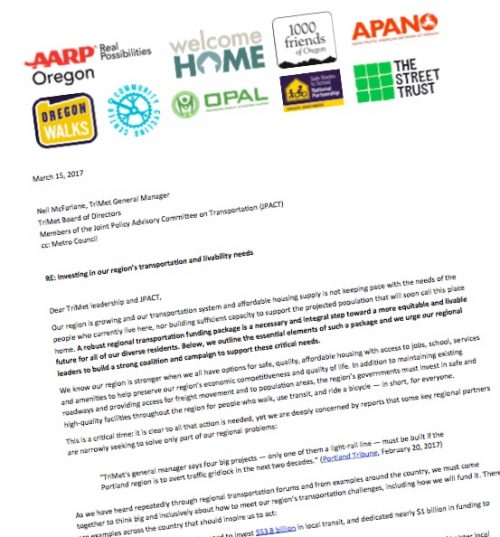
A powerful coalition of advocacy groups says they won’t support a regional funding proposal without “dollar-for-dollar” investment in biking, walking, and transit projects.
In a letter sent last week and addressed to TriMet General Manager Neil McFarlane, the TriMet Board of Directors and members of Metro’s Joint Policy Advisory Committee on Transportation (JPACT), the leaders of nine groups said the existing proposal — which is being worked on behind-closed-doors — is too focused on freeway expansions.
For several months now, a cabal of regional policymakers and power brokers have cooked up a plan to fund four major projects: expansions to Highway 217, Interstate 5 and Interstate 205; and the SW Corridor transit project.
“There is a growing disconnect between what we are hearing the public demand from policymakers — namely, safe and convenient travel options by foot, transit, and bicycle — and the infrastructure in which policymakers are deciding to invest.”
— from coalition letter
Last month, McFarlane emerged from the shadows to advocate for the proposal — a move that baffled advocates who questioned why our transit agency would promote infrastructure investments that will make driving easier. In response, BikeLoudPDX is encouraging activists to speak out in opposition at TriMet’s upcoming board meeting.
This new letter is a serious ratcheting up of opposition to the mysterious funding proposal. Its signatories include: 1000 Friends of Oregon Deputy Director Mary Kyle McCurdy; AARP Oregon State Director Gerald Cohen; Asian Pacific American Network of Oregon Associate Director Duncan Hwang; Associate Director; Community Cycling Center Communications and Marketing Manager Steph Routh; OPAL Environmental Justice Oregon Deputy Director Vivian Satterfield; Oregon Walks Executive Director Noel Mickelberry; Safe Routes to School National Partnership Regional Policy Manager Kari Schlosshauer; The Street Trust Policy Director Gerik Kranksy; and Welcome Home Coalition Director Jess Larson.
The collaboration of these groups marks a significant step forward in regional advocacy for active transportation.
It’s important to note this coalition doesn’t oppose the freeway expansions. They say they’ll only support a package that also funds biking, walking and transit at commensurate levels with highway projects. And that any funding package must adhere to six key principles.
Advertisement
Here’s an excerpt from the letter:
“In addition to maintaining existing roadways and providing access for freight movement and to population areas, the region’s governments must invest in safe and high-quality facilities throughout the region for people who walk, use transit, and ride a bicycle — in short, for everyone.
This is a critical time. It is clear to all that action is needed, yet we are deeply concerned by reports that some key regional partners are narrowly seeking to solve only part of our regional problems…
There is a growing disconnect between what we are hearing the public demand from policymakers — namely, safe and convenient travel options by foot, transit, and bicycle — and the infrastructure in which policymakers are deciding to invest.”
That “narrowly” part links directly TriMet GM McFarlane’s quote reported by the Portland Tribune March 20th where he said the freeway projects “must be built if the the Portland region is to avert traffic gridlock in the next two decades.”
The coalition then highlighted four local funding measures that recently passed in Seattle, San Jose, Los Angeles and Atlanta. The common theme in all of them was significant investment for biking, walking and transit.
“Yet, the Portland Metro region appears,” the letter continued, “to only give serious consideration to spot freeway expansions and one new light rail line that will serve a portion of the region, neglecting a broad focus on our shared climate, livability, equity, and safety goals.”
The nine coalition members refer to themselves as “partners” on the regional proposal who simply want to help make it better. If these regional power-brokers want the support of these groups — and the thousands of people they represent — any proposal that comes before votes must include these six principles: funding for maintenance and operations of existing facilities; active transportation infrastructure that focuses on safety; transit infrastructure; “equitable outcomes and community benefits”; congestion mitigation that includes congestion pricing, tolling, and more mode choices; and an equitable approach to housing impacts.
As funding debates heat up in the region (and in Salem), this letter is a flare in the night sky. Now we’ll have to see whether policymakers and bigwigs choose to see it — and more importantly — heed its warning.
— Read the full letter here (PDF).
— Jonathan Maus: (503) 706-8804, @jonathan_maus on Twitter and jonathan@bikeportland.org
BikePortland is supported by the community (that means you!). Please become a subscriber or make a donation today.


